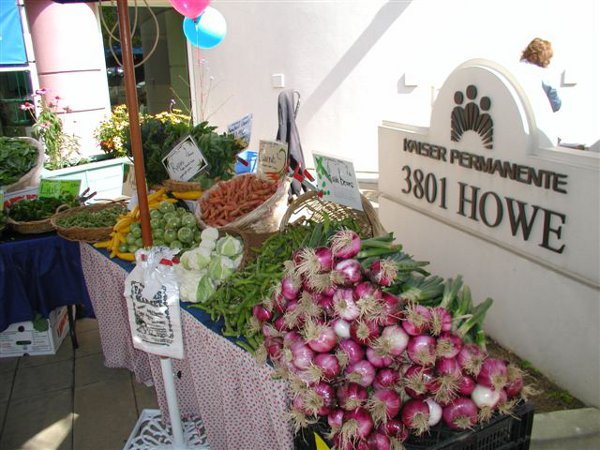January 7, 2012


OAKLAND, CA — Six hospital systems in the San Francisco Bay Area are joining with local food distributors to make healthy, sustainable food an integral part of the hospital network. The Regional Produce Sourcing Project aims to make sustainable food more available to hospital systems, and to create more demand for it. (Photo courtesy of Kaiser Permanente)
[nggallery id=88 template=carousel images=4] [imagebrowser id=88]
By Kathleen Haley January 7, 2012
OAKLAND, CA — Healthy, sustainable food is proliferating hospitals in the San Francisco Bay Area, thanks to The Regional Produce Sourcing Project.
The Regional Produce Sourcing Project is a joint effort between local food distributors and six hospital systems. Its main goals are to make sustainable food more available to hospital systems, and to create more demand for sustainable food.
“We’re trying to support farmers and farms that are currently engaged in sustainable production,” says Lucia Sayre, co-executive director of San Francisco Bay Area Physicians for Social Responsibility.
Sayre also cites the importance of supporting farmers who would like to leave traditional food production for organic methods, and of gaining local acreage for growing produce sustainably.
Dr. Preston Maring, a Kaiser Permanente physician, sees it this way: a healthy diet doesn’t just mean nutritious food. Eating healthily involves decisions about how food is grown and the working conditions of farm workers. It’s a step towards what he calls “total health.”
“Total health is not just treating sickness or doing operations or doing preventive care,” Maring says. “Total health is also trying to work within the broader community that the hospital serves to help with the overall health of the community.”
Community members, workers, and the environment all benefit from sustainable food that is grown and produced without toxic chemical pesticides and fertilizers, Maring says. In working towards “total health,” forty farmers markets are run or sponsored by Kaiser Permanente.
Kaiser Permanente, a strong advocate for sustainable food, is funding and participating in the Regional Produce Sourcing Project. About 15 percent of Kaiser Permanente’s food budget currently is used to buy sustainable food. Which, considering that Kaiser Permanente has 8.9 million members and has facilities in nine states and the District of Columbia, equals a sizeable quantity of food.
So far, the Kaiser Permanente system has used about 190 tons of sustainable fruits and vegetables in its patient meals. Certified organic fruits and vegetables make up about 6 percent of the produce that Kaiser Permanente buys. In the United States as a whole, overall consumption of organic fruits and vegetables is about 3 percent.
The organization is making efforts to move away from food treated with pesticides, added chemicals, and hormones, says Jan Villarante, who directs nutrition services at Kaiser Permanente.
Many health and environmental organizations recommend avoiding dairy products from cows treated with hormones. Even cows injected with rBGH are more likely to face serious health problems than cows without the hormone, according to the organization Health Care Without Harm.
Vending machines and cafeterias in Kaiser Permanente hospitals and medical centers offer milk and yogurt without the rBGH growth hormone. Patient meals also come with yogurt and milk that do not include rBGH. In another example of Kaiser Permanente’s work to advance sustainable food, fair trade coffee and tea are offered in the organization’s vending machines. Obtaining cage-free shelled eggs is now a new area of focus for Kaiser Permanente.
Other hospital systems participating in the Regional Produce Sourcing Project include the University of California-San Francisco Medical Center, San Francisco VA Medical Center, and Alta Bates Summit Medical Center.
Two organizations are overseeing the effort: the San Francisco Bay Area chapter of Physicians for Social Responsibility and the Community Alliance with Family Farmers.
Read Dr. Preston Maring’s recipes for green and healthy meals here.
Kathleen Haley is a writer for Sierra Club Green Home and a communications associate at Kaiser Permanente.
© 2012 SCGH, LLC.]]>